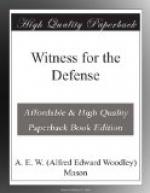The old man rose as soon as the door was closed.
“Now we might have a look at the miniatures, Mr. Thresk. You will excuse us, Margaret, won’t you?”
“Of course,” she answered upon a nod from her husband. The two men passed through the doors into the great library whilst Thresk took a more ceremonious leave of Mrs. Pettifer; and as Hazlewood opened the drawers of his cabinets Robert Pettifer said in a whisper:
“That was a pretty good failure, I must say. And it was my idea too.”
“Yes,” replied Hazlewood in a voice as low. “What do you think?”
“That they share no secret.”
“You are satisfied then?”
“I didn’t say that”; and Thresk himself appeared in the doorway and went across to the writing-table upon which Hazlewood had just laid a drawer in which miniatures were ranged.
“I haven’t met you,” said Pettifer, “since you led for us in the great Birmingham will-suit.”
“No,” answered Thresk as he took his seat at the table. “It wasn’t quite such a tough fight as I expected. You see there wasn’t one really reliable witness for the defence.”
“No,” said Pettifer grimly. “If there had been we should have been beaten.”
Mr. Hazlewood began to point out this and that miniature of his collection, bending over Thresk as he did so. It seemed that the two collectors were quite lost in their common hobby until Robert Pettifer gave the signal.
Then Mr. Hazlewood began:
“I am very glad to meet you, Mr. Thresk, for reasons quite outside these miniatures of mine.”
He spoke with a noticeable awkwardness, yet Henry Thresk disregarded it altogether.
“Oh?” he said carelessly.
“Yes. Being Richard’s father I am naturally concerned in everything which affects him nearly—the trial of Stella Ballantyne for instance.”
Thresk bent his head down over the tray.
“Quite so,” he said. He pointed to a miniature. “I saw that at Christie’s and coveted it myself.”
“Did you?” Mr. Hazlewood asked and he almost offered it as a bribe. “Now you gave evidence, Mr. Thresk.”
Thresk never lifted his head.
“You have no doubt read the evidence I gave,” he said, peering from this delicate jewel of the painter’s art to that.
“To be sure.”
“And since your son is engaged to Mrs. Ballantyne, I suppose that you were satisfied with it”—and he paused to give a trifle of significance to his next words—“as the jury was.”
“Yes, of course,” Mr. Hazlewood stammered, “but a witness, I think, only answers the questions put to him.”
“That is so,” said Thresk, “if he is a wise witness.” He took one of the miniatures out of the drawer and held it to the light. But Mr. Hazlewood was not to be deterred.
“And subsequent reflection,” he continued obstinately, “might suggest that all the questions which could throw light upon the trial had not been put.”




